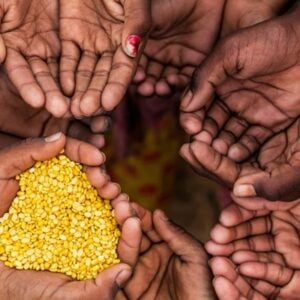As Asia’s agri-food systems continue to evolve rapidly, experts and researchers from ASEAN and BIMSTEC countries are gathering in Jakarta to address mutual challenges and explore opportunities for sustainable and inclusive agricultural development. The gathering is a two-day Policy Roundtable and Inception Workshop held on 4–5 August and jointly organized by IFPRI, IFAD, BIMSTEC, SEARCA, and NePAA. This event marks the official launch of the ATMI-II initiative, which aims to help ASEAN and BIMSTEC countries implement inclusive, climate-resilient, and market-integrated food systems.
In his opening remarks via recorded message, ASEAN Secretary-General Dr. Kao Kim Hourn emphasized the significance of regional collaboration for building resilient food systems. He noted that initiatives like ATMI-II are crucial for tackling both immediate and long-term challenges. BIMSTEC Secretary-General Indra Mani Pandey also stressed the value of regional cooperation in improving farmer incomes, ensuring food security, and building climate-resilient value chains.
The ATMI-II initiative focuses on countries such as Bangladesh, Bhutan, India, Nepal, the Philippines, Thailand, and Vietnam. It seeks to address structural and institutional reforms that can lead to more equitable and efficient agricultural markets. The event includes both a high-level policy roundtable and a technical workshop, attended by senior officials from ASEAN and BIMSTEC, IFAD, IFPRI, governments, regional think tanks, and civil society organizations.
The discussions revolved around major issues such as smallholder farmer inclusion, integration into regional value chains, and climate-smart agricultural policies. Global trade dynamics and agreements like the RCEP also influenced the conversation. IFAD’s Asia-Pacific Director Dr. Reehana Raza emphasized that platforms like NePAA can enhance regional policy coordination and ensure sustainable impact by building technical capacity and embedding lasting policy solutions.
NePAA members participated actively, contributing to the identification of key research and capacity-building priorities. National experiences were shared, and participants worked toward enhancing policy coherence across areas such as trade, employment, sustainability, and food security. Dr. Mercedita Sombilla of SEARCA highlighted that ATMI-II is committed to people-centered development, with a focus on empowering smallholder farmers, women, and marginalized communities.
Building on earlier ATMI-ASEAN collaboration, the new phase of the initiative aims to institutionalize NePAA as a long-term platform for regional policy dialogue. Dr. Shahidur Rashid of IFPRI reiterated this continuity, stating that the initiative leverages previous outcomes to deepen regional cooperation and learning among countries navigating similar agri-food transitions.
Adopting a South-South cooperation model, the initiative prioritizes inclusive growth, climate resilience, and market integration. Early discussions led to a shared understanding of the program’s vision, refinement of research themes, and alignment with ASEAN and BIMSTEC strategies. A draft action plan was also initiated to formalize NePAA as a long-term mechanism for technical and policy exchange.
With over 30 participants representing diverse sectors, the event laid a collaborative foundation for the next steps in transforming food systems across the region. The second day of the workshop is expected to continue this momentum through focused technical sessions and strategic planning discussions among key stakeholders.





